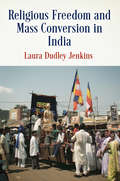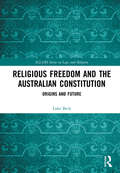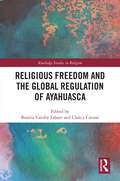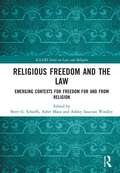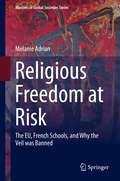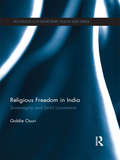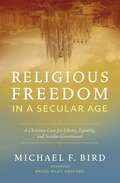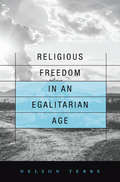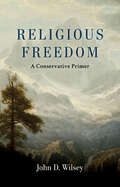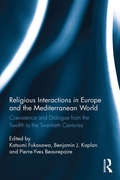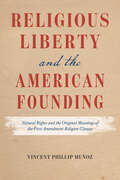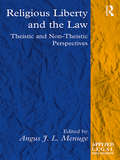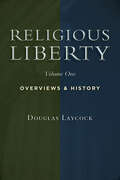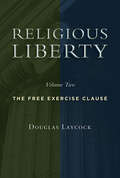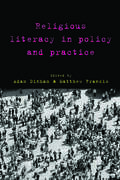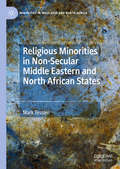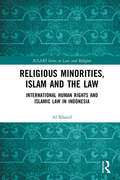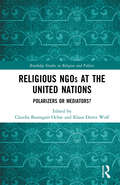- Table View
- List View
Religious Freedom and Mass Conversion in India (Pennsylvania Studies in Human Rights)
by Laura JenkinsHinduism is the largest religion in India, encompassing roughly 80 percent of the population, while 14 percent of the population practices Islam and the remaining 6 percent adheres to other religions. <P><P>The right to "freely profess, practice, and propagate religion" in India's constitution is one of the most comprehensive articulations of the right to religious freedom. Yet from the late colonial era to the present, mass conversions to minority religions have inflamed majority-minority relations in India and complicated the exercise of this right. <P><P>In Religious Freedom and Mass Conversion in India, Laura Dudley Jenkins examines three mass conversion movements in India: among Christians in the 1930s, Dalit Buddhists in the 1950s, and Mizo Jews in the 2000s. Critics of these movements claimed mass converts were victims of overzealous proselytizers promising material benefits, but defenders insisted the converts were individuals choosing to convert for spiritual reasons. >{?>{?Jenkins traces the origins of these opposing arguments to the 1930s and 1940s, when emerging human rights frameworks and early social scientific studies of religion posited an ideal convert: an individual making a purely spiritual choice. However, she observes that India's mass conversions did not adhere to this model and therefore sparked scrutiny of mass converts' individual agency and spiritual sincerity. <P><P>Jenkins demonstrates that the preoccupation with converts' agency and sincerity has resulted in significant challenges to religious freedom. One is the proliferation of legislation limiting induced conversions. Another is the restriction of affirmative action rights of low caste people who choose to practice Islam or Christianity. Last, incendiary rumors are intentionally spread of women being converted to Islam via seduction. <P><P>Religious Freedom and Mass Conversion in India illuminates the ways in which these tactics immobilize potential converts, reinforce damaging assumptions about women, lower castes, and religious minorities, and continue to restrict religious freedom in India today.
Religious Freedom and the Australian Constitution: Origins and Future (ICLARS Series on Law and Religion)
by Luke BeckThis book examines the origins of Australia’s constitutional religious freedom provision. It explores, on the one hand, the political activities and motives of religious leaders seeking to give the Australian Constitution a religious character and, on the other, the political activities and motives of a religious minority seeking to prevent the Australian Constitution having a religious character. The book also interrogates the argument advanced at the Federal Convention in favour of section 116, dealing with separation of religion and government, and argues that until now scholars and courts have misunderstood that argument. The book casts new light to show how the origins of the provision lead to section 116 being conceptualised as a safeguard against religious intolerance on the part of the Commonwealth. Written in an accessible style, the work has potential to influence the development of constitutional doctrine by the High Court through its challenge of historical assumptions on which the High Court’s current doctrine is based. Given the ongoing political debates concerning the interaction of discrimination law and religious freedom, the book will be of interest to academics and policy-makers working in the areas of law and religion, constitutional law and comparative law.
Religious Freedom and the Constitution
by Christopher L. Eisgruber Lawrence G. SagerReligion has become a charged token in a politics of division. In disputes about faith-based social services, public money for religious schools, the Pledge of Allegiance, Ten Commandments monuments, the theory of evolution, and many other topics, angry contestation threatens to displace America's historic commitment to religious freedom. Part of the problem, the authors argue, is that constitutional analysis of religious freedom has been hobbled by the idea of "a wall of separation" between church and state. That metaphor has been understood to demand that religion be treated far better than other concerns in some contexts, and far worse in others. Sometimes it seems to insist on both contrary forms of treatment simultaneously. Missing has been concern for the fair and equal treatment of religion. In response, the authors offer an understanding of religious freedom called Equal Liberty. Equal Liberty is guided by two principles. First, no one within the reach of the Constitution ought to be devalued on account of the spiritual foundation of their commitments. Second, all persons should enjoy broad rights of free speech, personal autonomy, associative freedom, and private property. Together, these principles are generous and fair to a wide range of religious beliefs and practices. With Equal Liberty as their guide, the authors offer practical, moderate, and appealing terms for the settlement of many hot-button issues that have plunged religious freedom into controversy. Their book calls Americans back to the project of finding fair terms of cooperation for a religiously diverse people, and it offers a valuable set of tools for working toward that end.
Religious Freedom and the Global Regulation of Ayahuasca (Routledge Studies in Religion)
by Beatriz Caiuby Labate Clancy CavnarThis book offers a comprehensive view of the legal, political, and ethical challenges related to the global regulation of ayahuasca, bringing together an international and interdisciplinary group of scholars. Ayahuasca is a psychoactive brew containing DMT, which is a Schedule I substance under the United Nations Convention on Psychotropic Substances, and the legality of its ritual use has been interpreted differently throughout the world. The chapters in this volume reflect on the complex implications of the international expansion of ayahuasca, from health, spirituality, and human rights impacts on individuals, to legal and policy impacts on national governments. While freedom of religion is generally protected, this protection depends on the recognition of a religion’s legitimacy, and whether particular practices may be deemed a threat to public health, safety or morality. Through acomparative analysis of different contexts in North America, South America and Europe in which ayahuasca is consumed, the book investigates the conceptual, philosophical, and legal distinctions among the fields of shamanism, religion, and medicine. It will be particularly relevant to scholars with an interest in Indigenous religion and in religion and law.
Religious Freedom and the Law: Emerging Contexts for Freedom for and from Religion (ICLARS Series on Law and Religion)
by Brett G. Scharffs Asher Maoz Ashley Isaacson WoolleyThis volume presents a timely analysis of some of the current controversies relating to freedom for religion and freedom from religion that have dominated headlines worldwide. The collection trains the lens closely on select issues and contexts to provide detailed snapshots of the ways in which freedom for and from religion are conceptualized, protected, neglected, and negotiated in diverse situations and locations. A broad range of issues including migration, education, the public space, prisons and healthcare are discussed drawing examples from Europe, the US, Asia, Africa and South America. Including contributions from leading experts in the field, the book will be essential reading for researchers and policy-makers interested in Law and Religion.
Religious Freedom at Risk
by Melanie AdrianThis book examines matters of religious freedom in Europe, considers the work of the European Court of Human Rights in this area, explores issues of multiculturalism and secularism in France, of women in Islam, and of Muslims in the West. The work presents legal analysis and ethnographic fieldwork, focusing on concepts such as laïcité, submission, equality and the role of the state in public education, amongst others. Through this book, the reader can visit inside a French public school located in a low-income neighborhood just south of Paris and learn about the complex dynamics that led up to the passing of the 2004 law banning Muslim headscarves. The chapters bring to light the actors and cultures within the school that set the stage for the passing of the law and the political philosophy that supports it. School culture and philosophy are compared and contrasted to the thoughts and opinions of the teachers, administrators and students to gage how religious freedom and identity are understood. The book goes on to explore the issue of religious freedom at the European Court of Human Rights. The author argues that the right to religious freedom has been too narrowly understood and is being fenced in by static visions of Islam. This jeopardizes the idea of religious freedom more broadly. By becoming entangled with regional and domestic politics, the Court is neglecting important nuances and is jeopardizing secularism, pluralism and democracy. This is a highly readable and accessible book that will appeal to students and scholars of law, anthropology, religious studies and philosophy of religion.
Religious Freedom in India: Sovereignty and (Anti) Conversion (Routledge Contemporary South Asia Series)
by Goldie OsuriDrawing on the critical and theoretical concepts of sovereignty, biopolitics, and necropolitics, this book examines how a normative liberal and secular understanding of India’s religious identity is translatable by Hindu nationalists into discrimination and violence against minoritized religious communities. Extending these concepts to an analysis of historical, political and legal genealogies of conversion, the author demonstrates how a concern for sovereignty links past and present anti-conversion campaigns and laws. The book illustrates how sovereignty informs the making of secularism as well as religious difference. The focus on sovereignty sheds light on the manner in which religious difference becomes a point of reference for the religio-secular idioms of Bombay cinema, for legal judgements on communal violence, for human rights organizations, and those seeking justice for communal violence. This wide-ranging examination and discussion of the trajectories of (anti) conversion politics through historical, legal, philosophical, popular cultural, archival and ethnographic material offers a cogent argument for shifting the stakes and rethinking the relationship between sovereignty and religious freedom. The book is a timely contribution to broader theoretical and political discussions of (post) secularism and human rights, and is of interest to students and scholars of postcolonial studies, cultural studies, law, and religious studies.
Religious Freedom in a Secular Age: A Christian Case for Liberty, Equality, and Secular Government
by Michael F. BirdDiscover how to responsibly defend religious freedom for all without compromising your personal beliefs.Religious freedom is a bitterly contested issue that spills over into political, public, and online spheres. It's an issue that's becoming ever more heated, and neither of the global political polarities is interested in protecting it. While the political left is openly hostile toward traditional religion, the political right seeks to weaponize it.How can we ensure that "religious freedom" is truly about freedom of one's religion rather than serving an ethno-nationalist agenda?In Religious Freedom in a Secular Age, Michael Bird (New Testament scholar and author of Evangelical Theology) has four main goals:To explain the true nature of secularism and help us to see it as one of the best ways of promoting liberty and mutual respect in a multifaith world.To dismantle the arguments for limiting religious freedom.To outline a biblical strategy for maintaining a Christian witness in a post-Christian society.To encourage Christians to participate in a new age of apologetics by being prepared to defend not only their own believes but also the freedom of all faiths.While Bird does address the recent political administrations in the US, his focus is global. Bird—who lives in Melbourne, Australia—freely admits to his anxiety of the militant secularism surrounding him, but he also strongly critiques the marriage of national and religious identities that has gained ground in countries like Hungary and Poland.The fact is that religion has a lot to contribute to the common good. Religious Freedom in a Secular Age will challenge readers of all backgrounds and beliefs not only to make room for peaceable difference, but also to find common ground on the values of justice, mercy, and equality.
Religious Freedom in an Egalitarian Age
by Nelson TebbeNelson Tebbe shows how a method called social coherence offers a way to resolve conflicts between advocates of religious freedom and proponents of equality law. Based on the way people reason through moral problems in everyday life, it can lead to workable solutions in a wide range of issues, including gay rights and women’s reproductive choice.
Religious Freedom: A Conservative Primer
by John D. WilseyA conservative perspective on vital questions about religious liberty In this timely book, historian John D. Wilsey addresses urgent questions about religious freedom in America. How have conservatives historically understood the meaning of religious freedom? How do Americans who identify as conservative now think about religious freedom in this era? What are the differences between the historical and contemporary views, and how do those differences shape fights about religious freedom today? Writing for fellow Americans concerned about threats to religious liberty, Wilsey draws on US history to explain why rather than weaponizing religious freedom in the context of the culture wars, today&’s conservatives need to rally around religious freedom to promote peace between church and state. With wisdom and acuity, Wilsey charts a path forward for thinking about and maintaining a uniquely American tradition: the harmony between liberty and religion that each generation has received as an inheritance from the generations preceding theirs.
Religious Fundamentalism and Political Extremism
by Leonard Weinberg and Ami PedahzurThis book explores the relationships between fundamentalist religious belief, political extremism and outbreaks of religiously inspired violence. Is the post-Cold War world increasingly violent and is this violence the result of strident religious understandings of how societies should be organized?
Religious Instruction for Soldiers in the First English Civil War, 1642–1646
by Antti TaipaleThis monograph examines religion in the first English Civil War as a tool for war both in instructing soldiers and portraying the enemy. It argues that thus far, the remarkable differences between the teaching of Parliamentarian and Royalist ministers to their respective armies have gone largely unnoticed. Relying on the methodologies of intellectual history combined with a comparative approach, it offers a new interpretation of soldiers&’ religious radicalism and highlights differences between the armies&’ spiritual edification. Hence, it contributes significantly to the history of the Wars of the Three Kingdoms and to the study of political radicalisation leading up to the regicide of Charles I. Moreover, it offers a detailed study of the ways in which religion was used as a tool for war in the early modern period. The role of religion has often been at the centre of historiography of the Wars of the Three Kingdoms (1639-1653). This prominence has culminated in the stereotypical character of a godly Puritan soldier, especially in relation to the New Model Army. However, while there have been debates about the role and importance of religion for the conduct and success of the armies, the theme of soldiers&’ religious instruction as a tool of advice and indoctrination has received less attention. The main aim of this book is thus to rectify this lack in the historiographical mainstream and to set out a new significant interpretation of the religious character of the Civil War.
Religious Interactions in Europe and the Mediterranean World: Coexistence and Dialogue from the 12th to the 20th Centuries
by Benjamin J. Kaplan Katsumi Fukasawa Pierre-Yves BeaurepaireThe religious histories of Christian and Muslim countries in Europe and Western Asia are often treated in isolation from one another. This can lead to a limited and simplistic understanding of the international and interreligious interactions currently taking place. This edited collection brings these national and religious narratives into conversation with each other, helping readers to formulate a more sophisticated comprehension of the social and cultural factors involved in the tolerance and intolerance that has taken place in these areas, and continues today. Part One of this volume examines the history of relations between people of different Christian confessions in western and central Europe. Part Two then looks at the relations between Western and Eastern Orthodox Christianity, Islam and Judaism in the vast area that extends around the Mediterranean from the Iberian Peninsula to western Asia. Each Part ends with a Conclusion that considers the wider implications of the preceding essays and points the way toward future research. Bringing together scholars from Asia, the Middle East, Europe, and America this volume embodies an international collaboration of unusual range. Its comparative approach will be of interest to scholars of Religion and History, particularly those with an emphasis on interreligious relations and religious tolerance.
Religious Liberties for Corporations?: Hobby Lobby, the Affordable Care Act, and the Constitution
by David H. Gans Ilya ShapiroAn expanded version of a series of debates between the authors, this book examines the nature of corporate rights, especially with respect to religious liberty, in the context of the controversial Hobby Lobby case from the Supreme Court's 2013-14 term.
Religious Liberty
by Williams Robinson Daniel N. Richard N.What are the rights of religious institutions? Should those rights extend to for-profit corporations? Houses of worship have claimed they should be free from anti-discrimination laws in hiring and firing ministers and other employees. Faith-based institutions, including hospitals and universities, have sought exemptions from requirements to provide contraception. Now, in a surprising development, large for-profit corporations have succeeded in asserting rights to religious free exercise. The Rise of Corporate Religious Liberty explores this "corporate" turn in law and religion. Drawing on a broad range perspectives, this book examines the idea of "freedom of the church," the rights of for-profit corporations, and the implications of the Supreme Court's landmark decision in Burwell v. Hobby Lobby for debates on anti-discrimination law, same-sex marriage, health care, and religious freedom.
Religious Liberty and the American Founding: Natural Rights and the Original Meanings of the First Amendment Religion Clauses
by Vincent Phillip MuñozAn insightful rethinking of the meaning of the First Amendment’s protection of religious freedom. The Founders understood religious liberty to be an inalienable natural right. Vincent Phillip Muñoz explains what this means for church-state constitutional law, uncovering what we can and cannot determine about the original meanings of the First Amendment’s Religion Clauses and constructing a natural rights jurisprudence of religious liberty. Drawing on early state constitutions, declarations of religious freedom, Founding-era debates, and the First Amendment’s drafting record, Muñoz demonstrates that adherence to the Founders’ political philosophy would lead neither to consistently conservative nor consistently liberal results. Rather, adopting the Founders’ understanding would lead to a minimalist church-state jurisprudence that, in most cases, would return authority from the judiciary to the American people. Thorough and convincing, Religious Liberty and the American Founding is key reading for those seeking to understand the Founders’ political philosophy of religious freedom and the First Amendment Religion Clauses.
Religious Liberty and the Law: Theistic and Non-Theistic Perspectives (Applied Legal Philosophy)
by Angus J. MenugeQuestions of religious liberty have become flashpoints of controversy in virtually every area of life around the world. Despite the protection of religious liberty at both national and supranational levels, there is an increasing number of conflicts concerning the proper way to recognize it – both in modern secular states and in countries with an established religion or theocratic mode of government. This book provides an analysis of the general concept of religious liberty along with a close study of important cases that can serve as test beds for conflict resolution proposals. It combines the insights of both pure academics and experienced legal practitioners to take a fresh look at the nature, scope and limits of religious liberty. Divided into two parts, the collection presents a blend of legal and philosophical approaches, and draws on cases from a wide range of jurisdictions, including Brazil, India, Australia, the USA, the Netherlands, and Canada. Presenting a broad range of views, this often provocative volume makes for fascinating reading for academics and researchers working in the areas of law and religion, legal philosophy and human rights.
Religious Liberty in a Polarized Age (Emory University Studies in Law and Religion)
by Thomas C. BergHow to heal America&’s deep divisions by preserving religious liberty for all As our political and social landscapes polarize along party lines, religious liberty faces threats from both sides. From antidiscrimination commissions targeting conservative Christians to travel bans punishing Muslims, recent litigation has revealed the selective approach both left and right take when it comes to freedom of religion. But what if religious liberty is part of the cure for our political division? Drawing on constitutional law, history, and sociology, Thomas C. Berg shows us how reaffirming religious freedom cultivates the good of individuals and society. After explaining the features of polarization and the societal benefits of diverse religious practices, Berg offers practical counsel on balancing religious freedom against other essential values. Protecting Americans&’ ability to live according to their beliefs undergirds a healthy, pluralistic society—and this protection must extend to everyone, not just political allies. Lay readers and legal scholars who are weary of partisan quarreling will find Berg&’s case timely and compelling.
Religious Liberty, Vol. 1: Overviews and History (Emory University Studies in Law and Religion)
by Douglas LaycockThe Collected Works on Religious Liberty comprehensively collects the scholarship, advocacy, and explanatory writings of leading scholar and lawyer Douglas Laycock, illuminating every major religious liberty issue from both theoretical and practical perspectives. / This first volume gives the big picture of religious liberty in the United States. It fits a vast range of disparate disputes into a coherent pattern, from public school prayers to private school vouchers to regulation of churches and believers. Laycock clearly and carefully explains what the law is and argues for what the law should be. He also reviews the history of Western religious liberty from the American founding to Protestant-Catholic conflict in the nineteenth century, using this history to cast light on the meaning of our constitutional guarantees. / Collected Works on Religious Liberty is unique in the depth and range of its coverage. Laycock helpfully includes both scholarly articles and key legal documents, and unlike many legal scholars, explains them clearly and succinctly. All the while, he maintains a centrist perspective, presenting all sides — believers and nonbelievers alike — fairly.
Religious Liberty, Volume 2: The Free Exercise Clause (Emory University Studies in Law and Religion)
by Douglas LaycockFor more than thirty years, Douglas Laycock has been studying, defending, and writing about religious liberty. In this second volume of the comprehensive collection of his writings on the subject, he has compiled articles, amicus briefs, and actual court documents relating to regulatory exemptions under the Constitution, the right to church autonomy, and the rights of non-mainstream religions. This collection — which deals with religious schools and colleges, sex abuse cases, the rights of Hare Krishnas and Scientologists, the landmark decision Employment Division v. Smith, and more — will be a valuable reference for churches, schools, and other religious organizations as they exercise their Constitutionally protected freedom of religion.
Religious Literacy in Policy and Practice
by Edited by Adam Dinham and Matthew FrancisIt has long been assumed that religion is in decline in the West: however it continues to have an important yet contested role in individual lives and in society at large. Furthermore half a century or so in which religion and belief were barely talked about in public has resulted in a pressing lack of religious literacy, leaving many ill-equipped to engage with religion and belief when they encounter them in daily life – in relationships, law, media, the professions, business and politics, among others. This valuable book is the first to bring together theory and policy with analysis and expertise on practices in key areas of the public realm to explore what religious literacy is, why it is needed and what might be done about it. It makes the case for a public realm which is well equipped to engage with the plurality and pervasiveness of religion and belief, whatever the individual’s own stance. It is aimed at academics, policy-makers and practitioners interested in the policy and practice implications of the continuing presence of religion and belief in the public sphere.
Religious Literacy, Law and History: Perspectives on European Pluralist Societies (ICLARS Series on Law and Religion)
by Alberto Melloni Francesca CadedduThe book profiles some of the macro and micro factors that have impact on European religious literacy. It seeks to understand religious illiteracy and its effects on the social and political milieu through the framing of the historical, institutional, religious, social, juridical and educational conditions within which it arises. Divided into four parts, in the first one, One literacy, more literacies?, the book defines the basic concepts underpinning the question of religious illiteracy in Europe. Part II, Understanding illiteracies, debating disciplines?, highlights the theological, philosophical, historical and political roots of the phenomenon, looking at the main nodes that are both the reasons religious illiteracy is widespread and the starting points for literacy strategies. Part III, Building literacy, shaping alphabets, examines the mix of knowledge and competences acquired about religion and from religion at school as well as through the media, with a critical perspective on what could be done both in the schools and for the improvement of journalists’ religious literacy. Part IV, Views and experiences, presents the reader with the opportunity to learn from three different case studies: religious literacy in the media, religious illiteracy and European Islam, and a Jewish approach to religious literacy. Building on existing literature, the volume takes a scientific approach which is enriched by interdisciplinary and transnational perspectives, and deep entrenchment in historical methodology.
Religious Minorities in Non-Secular Middle Eastern and North African States (Minorities in West Asia and North Africa)
by Mark TesslerThis book describes and compares the circumstances and lived experiences of religious minorities in Tunisia, Morocco, and Israel in the 1970s, countries where the identity and mission of the state are strongly and explicitly tied to the religion of the majority. The politics and identity of Jews in Tunisia and Morocco and Arabs in Israel are, therefore, shaped to a substantial degree by their status as religious minorities in non-secular states. This collection, based on in-depth fieldwork carried out during an important moment in the history of each community, and of the region, considers the nature and implications of each group’s response to its circumstances. It focuses on both the community and individual levels of analysis and draws, in part, on original public opinion surveys. It also compares the three communities in order to offer generalizable insights about ways the identity, political culture, and institutional character of a minority group are shaped by the broader political environment in which it resides. The project will appeal to scholars and students in the fields of Middle Eastern and North African studies, Judaic studies, Islamic Studies, minority group politics, and international relations and the Arab-Israeli conflict.
Religious Minorities, Islam and the Law: International Human Rights and Islamic Law in Indonesia (ICLARS Series on Law and Religion)
by Al KhanifThis book examines the legal conundrum of reconciling international human rights law in a Muslim majority country and identifies a trajectory for negotiating the protection of religious minorities within Islam. The work explores the history of religious minorities within Islam in Indonesia, which contains the world’s largest Muslim population, as well as the present-day ways by which the government may address issues through reconciling international human rights law and Islamic law. Given the context of multiple sets of religious norms in Indonesia, this is a complicated endeavour. In addition to amending and enacting human rights norms, the government is also negotiating with the long history of Islamisation in Indonesia. Particularly relevant is the practice of customary law, which puts the rights of community over individualism. This practice directly affects the rights of religious minorities within Islam. Readers, especially those conducting research, will also be provided with information and references which are relevant to the field of human rights, especially in relation to religious minorities and international law. The book will be a valuable resource for academics and researchers in the fields of International Human Rights Law, Law and Religion, and Islamic Studies.
Religious NGOs at the United Nations: Polarizers or Mediators? (Routledge Studies in Religion and Politics)
by Klaus Dieter Wolf Claudia Baumgart-OchseExamining the involvement of religious NGOs (RNGOs) at the UN, this book explores whether they polarize political debates at the UN or facilitate agreement on policy issues. The number of RNGOs engaging with the United Nations (UN) has grown considerably in recent years: RNGOs maintain relations with various UN agencies, member-state missions, and other NGOs, and participate in UN conferences and events. This volume includes both a quantitative overview of RNGOs at the UN and qualitative analyses of specific policy issues such as international development, climate change, business and human rights, sexual and reproductive health and rights, international criminal justice, defamation of religions, and intercultural dialogue and cooperation. The contributions explore the factors that explain the RNGOs’ normative positions and actions and scrutinise the assumption that religions introduce non-negotiable principles into political debate and decision-making that inevitably lead to conflict and division. Presenting original research on RNGOs and issues of global public policy, this volume will be relevant to both researchers and policy-makers in the fields of religion and international relations, the United Nations, and non-state actors and global governance.
